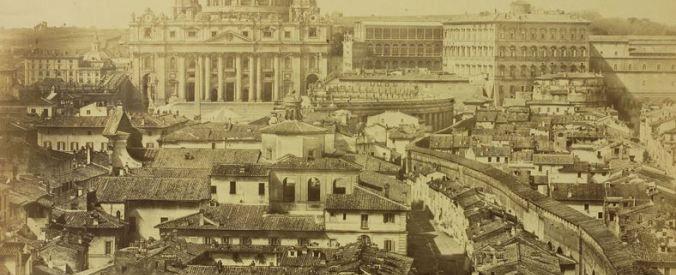Newman's Visit to Rome in 1833: Part II

Part 2. Letters Home
In a letter to his mother, Newman not only described how the Mediterranean was the seat of the most celebrated empires and events, but also how it had become the center of the lives of the church fathers. Newman also sent his mother verses about his favorite champion of orthodoxy, Athanasius, and other church fathers like Cyprian, Chrysostom, and Ambrose.[1] Peering across at the African coast, Newman could not resist "the thought of Cyprian and the glorious churches now apparently annihilated."[2] On 25 December 1832, they arrived at Malta, but had to spend Christmas day in a "most wretched" way without "the comfort and order of an Established Church." He was humbled by a Romanist who testified to the Savior through prayers towards the church over the sea. Even more, the thought of not being able to offer appropriate prayer, like Paul and Silas who sang praises in the prison, disgusted Newman.[3]
After seeing St. Paul's Bay, where according to tradition the Apostle was shipwrecked, Newman wrote:
"It is strange to be in a place where an Apostle has been; and it makes it still more afflicting thus to pass the day which especially celebrates the introduction of that glorious gospel which he preached. Surely there is something very wrong in the actual state of the Church in England – we are neither one thing [n]or the other; neither strong enough to command obedience, nor loose enough to protest in our separate persons."[4]
While observing and experiencing the ecclesial communities of Greece and Malta, Newman recalled the inadequacies in the life of his own church. Harboring at Parlatorio, he was fascinated by the sight of the people of Greece, the race, which produced great fathers like Nazianzen, Athanasius, and Chrysostom. Their present situation, however, made him feel "very melancholy – but surely the power, which out of the wild olive tree formed an Origen or Athanasius, can transformed [sic] them too."[5] Clearly, he was intrigued both by the scenic land of ancient Greek heroes and by the memories of the Greek fathers "born of the Spirit's fiery shower."[6]
Newman was relieved to know that dissenters were unknown in the Greek Church, but it appeared to him that there was much superstition among Greek Christians. He saw the church and supposedly the body of St. Spiridon, patron saint of the island of Corfu, "who was one of the Nicene Fathers – tho' doubtless it is not his body."[7] He found the Greek clergy too ignorant, but moral in their lives. For him, there was nothing objectionable in their rigid fasting[8] and prayer books. The doctrine of the Trinity was the prominent subject of all their prayers.[9] He also found the Greek liturgy most imposing,[10] and devotion to the Virgin and saints very common among Greeks. Newman examined the devotional books he found in a country church, one of which was a collection of prayers by John of Damascus, and he found nothing objectionable in them.[11] He questioned the popular piety, which was often viewed as superstition by his countrymen:
"By the bye, what answer do Protestants make, to the fact of the Greek Church invoking saints, over honoring the Virgin, and substituting ceremonies for a reasonable service, which they say are the prophetic marks of Antichrist? I do not see the Romanists are more than advanced Greeks, the errors being the same, the degree less in the latter."[12]
Compared to the grandeur of Rome and its church, Newman thought that the Greek Church was in a better state. The Greek Church did not teach Purgatory or the Mass, which for him then, were the two chief practical delusions of Romanism.[13] He shared his observations with his sister Jemima:
"As to poor Italy, it is mournful to think about it. . . . I fear I must look on Rome, as a city, still under a curse . . . Then as to Greece, the prospect is hopeful, considering its favorable leaning towards the English Church – and its corruptions seem in the retrospect light as air compared with those of Rome."[14]
The magnificence of St. John's Church in Malta impressed Newman so much that he became deeply reflective about the fate of the church in general:
"I am impressed with a sad presentiment, as if the gift of truth, when once lost, was lost for ever and so the Christian world is gradually becoming barren and effete, as land which has been worked out and is become sand. We have lasted longer than the South, but we are going (it appears) also. As for the number of sects, which have split off from the Church, many of them have already ended in Soc[in]ianism, a heresy ten thousand times worse than any in Rome or Constantinople."[15]
Nostalgia for home never left Newman. Even when he reached Rome, he reminisced about the blessings of home and feared their destruction by the politicians.[16] When they arrived at Naples on Wednesday, 13 February 1833, he found it's people "immersed in the most despicable frivolity and worst profligacy."[17]
After visiting the town and some of the principal churches, he wrote to Jemima: "there was nothing there to offend me, however, more the whole city itself, which does offend me very much."[18] Moreover, his anxiety for the Church of England was heightened when he observed the deplorable conditions of the churches he visited.[19] Witnessing directly the pathetic conditions of the churches and the way the political powers were plundering the churches and depriving them of their rights and privileges made Newman more nervous about the changes happening back at home: "It has surprised us to see how far Ministers have gone in their Irish Church Reform Bill."[20]
[1] Newman to Mrs. Newman (On board the Hermes, 19 Dec. 1832), LD, iii, 155-62.
[2] Newman to Mrs. Newman (On board the Hermes, 19 Dec. 1832), LD, iii, 158.
[3] Newman to Harriett Newman (On board the Hermes, Malta, 25 Dec. 1832), LD, iii, 162-66, at 162.
[4] Newman to Harriett Newman (On board the Hermes, Malta, 25 Dec. 1832), LD, iii, 163.
[5] Newman to Harriett Newman (On board the Hermes, Malta, 25 Dec. 1832), LD, iii, 164.
[6] Newman wrote: "[I] am full of joy to overflowing – for I am in the Greek sea, the scene of old Homer's song and of the histories of Thucydides." Newman penned more verses on the Greek fathers: "The Greek Fathers," was published with minor variations in Verses on Various Occasions, 102-103; also see Newman to Jemima Newman (On board the Hermes between Zante and Patras, 29 Dec 1832), LD, iii, 166-70.
[7] Newman to Harriett Newman (On board the Hermes, Corfu, 2 Jan. 1833), LD, iii: 180.
[8] Newman to John Frederic Christie (Rome, 7 Mar. 1833), LD, iii, 239.
[9] Newman to Harriett (On board the Hermes, Corfu, 2 Jan. 1833), LD, iii, 180.
[10] Newman to Jemima (Lazaretto, Malta, 15 Jan. 1833), LD, iii, 192.
[11] Newman to Harriett (On board the Hermes, Corfu on 2 Jan. 1833), LD , iii, 181.
[12] Newman to Mrs. Newman (Malta, 26 Jan. 1833), LD, iii, 205.
[13] Newman to Jemima Newman (Rome, 20 Mar. 1833), LD, iii, 265.
[14] Newman to Jemima Newman (Rome, 20 Mar. 1833), LD, iii, 265.
[15] Newman to Mrs. Newman (Malta, 26 Jan. 1833), LD, iii, 204-205.
[16] Newman to Mrs. Newman (Malta 26 Jan. 1833), LD, iii, 206.
[17] Newman shared his first impressions about Naples with Harriet: "We find a population from high to low, which is so much connected with religious observance as to give the city the character of a pagan worship." (Naples, 16 Feb. 1833), LD, iii, 211.
[18] Newman to Jemima Newman (Naples, 19 Feb. 1833), LD, iii, 216. Giving a traveler's description on Sicily, he wrote to his mother: "The mixture of grandeur and filth in the towns is indescribable, and to an Englishman inconceivable." (Naples, 28 Feb 1833), LD, iii, 223-24.
[19] Newman to Mrs. Newman (Naples, 28 Feb. 1833), LD, iii, 224.
[20] The Church Temporalities Act of July 1833 abolished ten Sees of the established (Anglican) Church of Ireland and introduced a tax on bishoprics, chapters, and the rich.
Share
Fr. Joseph Elamparayil
Independent Scholar, Catholic University of America
Fr. Joseph Elamparayil is a graduate of The Catholic University of America. His dissertation is titled, "John Henry Newman's Lectures on the Prophetical Office of the Church: A Contextual History and Ecclesiological Analysis."
Topics
Newsletter
QUICK LINKS

